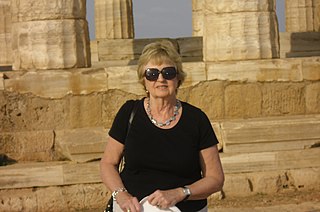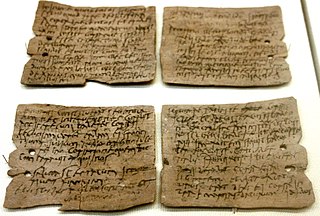Related Research Articles
Onomastics is the study of the etymology,history,and use of proper names. An orthonym is the proper name of the object in question,the object of onomastic study.

A name is a term used for identification by an external observer. They can identify a class or category of things,or a single thing,either uniquely,or within a given context. The entity identified by a name is called its referent. A personal name identifies,not necessarily uniquely,a specific individual human. The name of a specific entity is sometimes called a proper name and is,when consisting of only one word,a proper noun. Other nouns are sometimes called "common names" or (obsolete) "general names". A name can be given to a person,place,or thing;for example,parents can give their child a name or a scientist can give an element a name.
Dorothy Margaret Doig Edgington FBA is a philosopher active in metaphysics and philosophical logic. She is particularly known for her work on the logic of conditionals and vagueness.
Prosopography is an investigation of the common characteristics of a group of people,whose individual biographies may be largely untraceable. Research subjects are analysed by means of a collective study of their lives,in multiple career-line analysis. The discipline is considered to be one of the auxiliary sciences of history.
Bachelor of Philosophy is the title of an academic degree that usually involves considerable research,either through a thesis or supervised research projects. Unlike many other bachelor's degrees,the BPhil is typically a postgraduate degree awarded to individuals who have already completed a traditional undergraduate degree.
Sir Fergus Graham Burtholme Millar,was a British ancient historian and academic. He was Camden Professor of Ancient History at the University of Oxford between 1984 and 2002. He numbers among the most influential ancient historians of the 20th century.

Dame Averil Millicent Cameron,often cited as A. M. Cameron,is a British historian. She was Professor of Late Antique and Byzantine History at the University of Oxford,and the Warden of Keble College,Oxford,between 1994 and 2010.

The Vindolanda tablets were,at the time of their discovery,the oldest surviving handwritten documents in Britain. They are a rich source of information about life on the northern frontier of Roman Britain. Written on fragments of thin,post-card sized wooden leaf-tablets with carbon-based ink,the tablets date to the 1st and 2nd centuries AD. Although similar records on papyrus were known from elsewhere in the Roman Empire,wooden tablets with ink text had not been recovered until 1973,when archaeologist Robin Birley,his attention being drawn by student excavator Keith Liddell,discovered some at the site of Vindolanda,a Roman fort in northern England.
Timothy J. Cornell is a British historian specializing in ancient Rome. He is an Emeritus Professor of Ancient History at the University of Manchester,having retired from his teaching position in 2011.
Elaine Fantham was a British-Canadian classicist whose expertise lay particularly in Latin literature,especially comedy,epic poetry and rhetoric,and in the social history of Roman women. Much of her work was concerned with the intersection of literature and Greek and Roman history. She spoke fluent Italian,German and French and presented lectures and conference papers around the world—including in Germany,Italy,the Netherlands,Norway,Argentina,and Australia.
In the modern world,Greeks names are the personal names among people of Greek language and culture generally consist of a given name and a family name.
Simon Hornblower,FBA is an English classicist and academic. He is Professor of Classics and Ancient History in the University of Oxford and Senior Research Fellow of All Souls College,Oxford.

Jocelyn Mary Catherine Toynbee,was an English archaeologist and art historian. "In the mid-twentieth century she was the leading British scholar in Roman artistic studies and one of the recognized authorities in this field in the world." Having taught at St Hugh's College,Oxford,the University of Reading,and Newnham College,Cambridge,she was Laurence Professor of Classical Archaeology at the University of Cambridge from 1951 to 1962.

The Illyrian language was an Indo-European language or group of languages spoken by the Illyrians in Southeast Europe during antiquity. The language is unattested with the exception of personal names and placenames. Just enough information can be drawn from these to allow the conclusion that it belonged to the Indo-European language family.
Andrew Ian Wilson is a British classical archaeologist and Head of School of Archaeology at the University of Oxford. He was director of the Oxford Institute of Archaeology from 2009 to 2011. Wilson's main research interests are the economy of the Roman world,Greek and Roman water supply,and ancient technology.

The Faculty of Classics,previously the Faculty of Literae Humaniores,is a subdivision of the University of Oxford concerned with the teaching and research of classics. The teaching of classics at Oxford has been going on for 900 years,and was at the centre of nearly all its undergraduates' education well into the twentieth century.
The study of ancient Greek personal names is a branch of onomastics,the study of names,and more specifically of anthroponomastics,the study of names of persons. There are hundreds of thousands and even millions of Greek names on record,making them an important resource for any general study of naming,as well as for the study of ancient Greece itself. The names are found in literary texts,on coins and stamped amphora handles,on potsherds used in ostracisms,and,much more abundantly,in inscriptions and on papyri. This article will concentrate on Greek naming from the 8th century BC,when the evidence begins,to the end of the 6th century AD.

Anna Elbina Morpurgo Davies,was an Italian philologist who specialised in comparative Indo-European linguistics. She spent her career at Oxford University,where she was the Professor of Comparative Philology and Fellow of Somerville College.
Jane Rowlandson was a British historian who specialised in the economic and social history of Egypt during the Greek and Roman periods. She was a lecturer in Ancient History at King's College,London for 16 years,retiring in 2005. In 1996 she published the influential book Landowners and Tenants in Roman Egypt. She died in 2018.
John David Thomas,FBA,usually known as J. David Thomas,is a papyrologist and classical scholar. He was Professorial Fellow in Papyrology at Durham University between 1990 and 1992. He completed his undergraduate education at Worcester College,Oxford,and then carried out doctoral studies at the University of Wales. He lectured at the University College of Wales,Aberystwyth,from 1955 to 1966,when he was appointed to a lectureship in palaeography at Durham. He remained there and was promoted to a readership in papyrology in 1977,before his appointed to the professorial fellowship in 1990. Since retiring in 1992,he has been an emeritus professor at Durham.
References
- ↑ Bowman, Alan (2011). "Elaine Matthews". Britannia. 42: xii–xiv.
- ↑ Bowman, Alan (2010). "Elaine Matthews: An Appreciation". Onomatologos: 1–4.
- ↑ Catling, Marchand & Sasanow (2010). Onomatologos. Studies in Greek Personal Names presented to Elaine Matthews. Oxford: Oxbow Books. ISBN 9781842179826.
- ↑ "Society for the Promotion of Roman Studies". Open Charities register.
- ↑ "2011 Annual Report" (PDF). Society for the Promotion of Roman Studies.
- ↑ Bowman, Alan and Jackie. "Elaine Matthews obituary". The Guardian. Retrieved 22 May 2017.